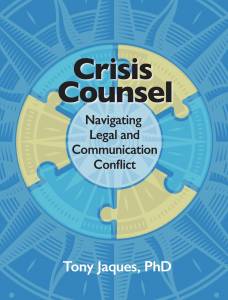How an avoidable mistake derailed a crisis response
by Tony Jaques, Director of Issue Outcomes Pty Ltd, for people who work in issue and crisis management
When a 50-car freight train carrying toxic chemicals derailed and caught fire near the small town of East Palestine in rural Ohio in February, it was always going to be a corporate crisis and a state-wide disaster.
It has now become an ongoing international news story with allegations of bureaucratic incompetence; reports of widespread contamination; about 3,500 fish dead in nearby waterways; party-political finger-pointing and even conspiracy theories.
Moreover, a crucial mistake by the railway company at the heart of the crisis helped make it even worse.
The initial response by Norfolk Southern Railway seemed pretty much textbook – announcing an immediate start to clean up; establishing a Family Assistance Center to help meet community needs; supporting comprehensive testing of water, air, and soil; and distributing over $1.5 million in direct financial assistance to more than 1,000 families and businesses. They also set up a $1 million community support fund “as a down payment on our commitment to help rebuild”, including air purifiers for residents to use in their homes, and replacing breathing apparatus for the local fire brigade.
So far so good. Similarly, the CEO’s statement was well written and appeared sincere – albeit posted on their website almost two weeks after the accident. “I know you are tired. I know you are worried,” he said. “We will not walk away. We will not let you down.”
But all that effort was undone by a single, extraordinarily tone-deaf decision. With residents reporting headaches, rashes, and a range of other health effects – and confused by officials declaring the water and air were safe, yet advising residents to drink bottled water – the locals organized a public meeting to voice their anger and to seek reassurance and updated information about what one resident called “our Chernobyl”.
However, just hours before the meeting in the high school gymnasium, Norfolk Southern announced it would not attend. In a statement, the company said it had become “increasingly concerned about the growing physical threat” to its employees because of the likelihood of “outside parties” participating. No mention of the “physical threat” to residents from the chemical spill itself.
Every crisis manager knows that town hall meetings are fraught with risk – from extreme opinions dominating, to alternative viewpoints being drowned out, and actual loss of control.
In some crises – and this was one – the company simply needs to front up, regardless of how painful it is sure to be. Norfolk Southern knew the public meeting would undoubtedly be heated and emotional, with no expectation at all of a positive outcome. Which is exactly as it transpired. Yet they needed to be seen to be listening to the angry voices and explaining their many positive actions. Their refusal to attend further damaged an already fragile reputation.
As the East Palestine derailment crisis continues to unfold – with multiple lawsuits pending – it’s worth remembering the “Seven Cardinal Rules for Risk Communication” developed for the US EPA 35 years ago by Vince Covello and Fred Allen:
- Accept and involve the public as a legitimate partner.
- Plan carefully and evaluate your efforts.
- Listen to the public’s specific concerns.
- Be honest, frank, and open.
- Coordinate and collaborate with other credible sources.
- Meet the needs of the media.
- Speak clearly and with compassion.
It was good advice then . . . and it’s good advice today.
Footnote: Three weeks after the derailment, the EPA ordered Norfolk Southern to pay all clean-up and compensation costs, and to “take part in public meetings at the EPA’s request”. Not before time.
++++++++++++++++++++++++++++++++
A Parting Thought
“90 percent of a crisis response is communications”
Barbara Reynolds, US CDC.
++++++++++++++++++++++++++++++++
Tony Jaques is Director of Issue Outcomes Pty Ltd, for people who work in issue and crisis management
Learn more about Reputation Risk, CEO apologies, and Crisis communication in Tony Jaques’ new book, Crisis Counsel: Navigating Legal and Communication Conflict.
“Crisis Counsel confirms Tony Jacques’ position as one of the industry’s foremost experts on issues and crisis management. In addressing the complex interactions between legal and communication crisis responses Dr. Jacques provides riveting case studies and practical advice. It highlights the financial and reputation risks of not effectively integrating communications and legal counsel. It should be on every communications practitioner’s reading list and companies should insist their in-house and external legal counsellors read it.” – Noel Turnbull, Former Chair of Turnbull Porter Novelli, Adjunct Professor, RMIT University.
“For senior managers who find themselves in the C-suite for the first time, Crisis Counsel should be mandatory reading. Such specific legal and communications provocations are not covered in university management courses, and the introduction is replete with illuminating case studies and key takeaways. The author provides sage advice for Chief Executives who must ultimately make a decision based on what they think is the right thing to do; often under pressure. Crisis team leaders and team members will find this book equally of value, as the more you know about it, the better you and the team will be.” – Jim Truscott, Director, Jim Truscott & Associates Pty Ltd, Perth, Australia
“For far too long, the role of lawyers in crisis management has been neglected. If discussed at all, it is often in negative terms. Tony Jaques adjusts this picture in masterly, yet eminently readable terms. His comprehensive discussion of apology in crisis management is likely to be a go-to source for years to come. This is a welcome book for anyone interested in how crisis-confronted corporations (and other organizations, too) can navigate the tricky legal waters of communicating under fire. For university teachers like me, it’s a rich source of well-researched case studies. A gem!” – Chris Galloway, PhD, Head of Public Relations, Massey University of New Zealand

